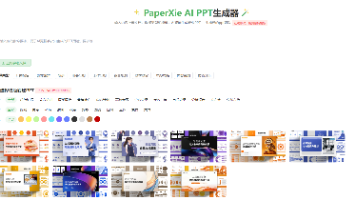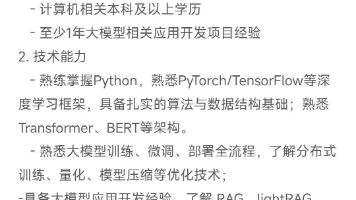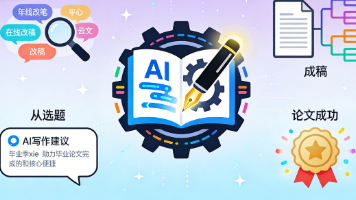AI的出现,是否能替代IT从业者?
AI技术正在深刻改变IT行业,引发关于其是否会取代IT从业者的讨论。目前AI已广泛应用于代码生成、系统运维和自动化测试等领域,能显著提升效率并降低技术门槛。然而,AI在复杂算法、业务理解和创新思维方面仍存在局限。IT从业者应关注AI无法替代的技能,如高级问题解决能力和业务理解,同时适应AI工具的使用。AI并非职业终结者,而是推动行业转型的工具,从业者需提升自身能力以应对变革。
AI的出现,是否能替代IT从业者?
AI在IT领域中的应用已成趋势,IT 从业者们站在这风暴之眼,面临着一个尖锐问题:AI 是否会成为 “职业终结者”?
1. 引言
在人工智能技术飞速发展的今天,IT行业正站在变革的风暴之眼。从ChatGPT到GitHub Copilot,从自动化测试到智能运维,AI正在以惊人的速度渗透到IT领域的每一个角落。这引发了一个尖锐而深刻的问题:AI是否会成为IT从业者的"职业终结者"?
有人担忧AI将取代IT行业的大部分工作,让无数程序员、系统管理员、测试工程师面临失业风险;也有人坚信IT从业者的专业技能、创新思维和问题解决能力是AI无法替代的。这个话题充满了争议与悬念,值得我们深入探讨。
本文将全面分析AI在IT领域的发展现状,探讨其对IT从业者的影响,分析不同观点的合理性,并尝试为IT从业者提供应对策略和发展建议。
2. AI在IT领域的发展现状
2.1 AI技术在各IT岗位的应用
软件开发领域:
# AI辅助代码生成示例
# 使用GitHub Copilot等工具,AI可以:
# 1. 自动补全代码
def calculate_fibonacci(n):
if n <= 1:
return n
return calculate_fibonacci(n-1) + calculate_fibonacci(n-2)
# 2. 生成测试用例
def test_fibonacci():
assert calculate_fibonacci(0) == 0
assert calculate_fibonacci(1) == 1
assert calculate_fibonacci(10) == 55
# 3. 代码重构和优化
def calculate_fibonacci_optimized(n):
if n <= 1:
return n
a, b = 0, 1
for _ in range(2, n + 1):
a, b = b, a + b
return b
系统运维领域:
# AI驱动的智能运维配置
apiVersion: v1
kind: ConfigMap
metadata:
name: ai-monitoring-config
data:
monitoring.yaml: |
# AI异常检测配置
anomaly_detection:
enabled: true
algorithms:
- statistical_analysis
- machine_learning
- pattern_recognition
thresholds:
cpu_usage: 80%
memory_usage: 85%
disk_usage: 90%
# 自动故障恢复
auto_recovery:
enabled: true
actions:
- restart_service
- scale_horizontal
- failover_to_backup
测试自动化领域:
// AI驱动的测试用例生成
class AITestGenerator {
constructor() {
this.testPatterns = [
'boundary_value_analysis',
'equivalence_partitioning',
'decision_table_testing',
'state_transition_testing'
];
}
generateTestCases(functionSpec) {
// AI分析函数规格,自动生成测试用例
const testCases = [];
// 边界值测试
testCases.push(...this.generateBoundaryTests(functionSpec));
// 等价类测试
testCases.push(...this.generateEquivalenceTests(functionSpec));
// 异常情况测试
testCases.push(...this.generateExceptionTests(functionSpec));
return testCases;
}
generateBoundaryTests(spec) {
// AI自动识别边界条件
return spec.parameters.map(param => ({
name: `boundary_test_${param.name}`,
input: param.boundary_values,
expected: spec.expected_output,
type: 'boundary'
}));
}
}
2.2 AI技术能力分析
当前AI在IT领域的能力:
-
代码生成和补全
- 准确率:70-80%
- 适用场景:标准业务逻辑、CRUD操作
- 局限性:复杂算法、业务规则理解
-
自动化测试
- 覆盖率:60-70%
- 适用场景:回归测试、性能测试
- 局限性:探索性测试、用户体验测试
-
系统监控和故障诊断
- 准确率:80-90%
- 适用场景:常见故障模式、性能异常
- 局限性:复杂系统交互、业务逻辑故障
-
文档生成和代码注释
- 质量:中等
- 适用场景:API文档、基础注释
- 局限性:业务上下文、设计决策
3. AI对IT从业者的影响分析
3.1 积极影响
提升工作效率:
# 传统开发流程 vs AI辅助开发流程
class TraditionalDevelopment:
def develop_feature(self, requirements):
# 1. 需求分析 (2小时)
analysis_time = 2
# 2. 设计架构 (3小时)
design_time = 3
# 3. 编写代码 (8小时)
coding_time = 8
# 4. 编写测试 (4小时)
testing_time = 4
# 5. 调试修复 (3小时)
debugging_time = 3
total_time = analysis_time + design_time + coding_time + testing_time + debugging_time
return total_time # 总计20小时
class AIAssistedDevelopment:
def develop_feature(self, requirements):
# 1. 需求分析 (1小时) - AI辅助分析
analysis_time = 1
# 2. 设计架构 (2小时) - AI提供建议
design_time = 2
# 3. 编写代码 (4小时) - AI代码生成
coding_time = 4
# 4. 编写测试 (2小时) - AI自动生成
testing_time = 2
# 5. 调试修复 (1小时) - AI辅助诊断
debugging_time = 1
total_time = analysis_time + design_time + coding_time + testing_time + debugging_time
return total_time # 总计10小时,效率提升50%
降低技术门槛:
// AI让复杂技术变得简单
// 传统方式:需要深入理解机器学习算法
class TraditionalMLApproach {
constructor() {
this.requires = [
'数学基础',
'统计学知识',
'算法理解',
'编程技能',
'数据处理经验'
];
}
buildModel(data) {
// 需要手动实现复杂的机器学习算法
// 需要调参、特征工程、模型评估等
return 'complex_manual_implementation';
}
}
// AI辅助方式:专注于业务逻辑
class AIAssistedMLApproach {
constructor() {
this.requires = [
'业务理解',
'问题定义',
'结果解释'
];
}
buildModel(data) {
// AI自动处理算法选择、参数调优、特征工程
const aiModel = new AIModelBuilder();
return aiModel.autoBuild(data, {
problemType: 'classification',
targetVariable: 'user_behavior',
businessContext: 'recommendation_system'
});
}
}
3.2 挑战和威胁
技能贬值风险:
# 技能价值变化分析
class SkillValueAnalysis:
def __init__(self):
self.skill_categories = {
'high_risk': [
'基础编程',
'简单测试',
'重复性运维',
'文档编写'
],
'medium_risk': [
'中级开发',
'系统集成',
'性能调优',
'数据库管理'
],
'low_risk': [
'架构设计',
'业务分析',
'创新研发',
'团队管理'
]
}
def analyze_skill_impact(self, skill):
if skill in self.skill_categories['high_risk']:
return {
'risk_level': 'high',
'automation_potential': 80,
'human_value': 20,
'recommendation': '需要转型或提升技能'
}
elif skill in self.skill_categories['medium_risk']:
return {
'risk_level': 'medium',
'automation_potential': 50,
'human_value': 50,
'recommendation': '需要与AI协作'
}
else:
return {
'risk_level': 'low',
'automation_potential': 20,
'human_value': 80,
'recommendation': '继续发展核心能力'
}
就业市场变化:
# 就业市场影响预测
class JobMarketImpact:
def __init__(self):
self.impact_scenarios = {
'optimistic': {
'new_jobs_created': 30,
'jobs_automated': 20,
'net_impact': '+10%',
'description': 'AI创造更多新岗位'
},
'realistic': {
'new_jobs_created': 15,
'jobs_automated': 25,
'net_impact': '-10%',
'description': '短期内有岗位减少'
},
'pessimistic': {
'new_jobs_created': 5,
'jobs_automated': 40,
'net_impact': '-35%',
'description': '大规模岗位替代'
}
}
def predict_impact(self, timeframe='5_years'):
# 基于历史数据和趋势分析
return {
'timeframe': timeframe,
'most_likely_scenario': self.impact_scenarios['realistic'],
'confidence_level': 75,
'key_factors': [
'AI技术成熟度',
'企业采用速度',
'监管政策影响',
'经济环境变化'
]
}
4. IT从业者的核心价值和不可替代性
4.1 人类独有的能力
创造性思维:
# 人类创造性思维 vs AI模式化思维
class HumanCreativity:
def __init__(self):
self.unique_abilities = [
'跨领域思维',
'直觉判断',
'情感理解',
'文化感知',
'道德判断'
]
def solve_complex_problem(self, problem):
# 人类解决问题的方式
solution = {
'approach': 'creative_synthesis',
'process': [
'直觉感知问题本质',
'跨领域知识整合',
'创新方案设计',
'情感和文化考量',
'道德和伦理评估'
],
'result': 'innovative_human_solution'
}
return solution
class AIPatternMatching:
def __init__(self):
self.abilities = [
'模式识别',
'数据关联',
'统计推理',
'规则应用'
]
def solve_problem(self, problem):
# AI解决问题的方式
solution = {
'approach': 'pattern_matching',
'process': [
'历史数据搜索',
'相似案例匹配',
'统计模型应用',
'规则集执行'
],
'result': 'optimized_known_solution'
}
return solution
业务理解和沟通:
# 业务理解能力对比
class BusinessUnderstanding:
def __init__(self):
self.human_advantages = {
'context_understanding': {
'description': '理解业务背景和文化',
'example': '理解为什么用户需要这个功能',
'ai_limitation': '只能基于数据推断'
},
'stakeholder_communication': {
'description': '与不同利益相关者沟通',
'example': '向非技术用户解释技术方案',
'ai_limitation': '缺乏情感和同理心'
},
'requirement_interpretation': {
'description': '解读模糊和不完整的需求',
'example': '从"用户友好"推断具体实现',
'ai_limitation': '需要明确和完整的信息'
}
}
def analyze_requirement(self, requirement):
# 人类分析需求的方式
analysis = {
'explicit_requirements': self.extract_explicit(requirement),
'implicit_requirements': self.infer_implicit(requirement),
'business_context': self.understand_context(requirement),
'stakeholder_needs': self.identify_stakeholders(requirement),
'technical_constraints': self.analyze_constraints(requirement)
}
return analysis
4.2 复杂问题解决能力
系统思维:
# 系统思维 vs 局部优化
class SystemThinking:
def __init__(self):
self.thinking_dimensions = [
'整体性思维',
'动态性思维',
'关联性思维',
'层次性思维'
]
def analyze_system(self, system):
analysis = {
'system_boundary': self.define_boundary(system),
'components': self.identify_components(system),
'interactions': self.map_interactions(system),
'feedback_loops': self.find_feedback_loops(system),
'emergent_properties': self.identify_emergence(system),
'system_goals': self.understand_goals(system)
}
return analysis
def optimize_system(self, system, objective):
# 系统级优化考虑
optimization = {
'local_optimization': self.optimize_components(system),
'global_optimization': self.optimize_interactions(system),
'trade_offs': self.analyze_tradeoffs(system),
'side_effects': self.predict_side_effects(system),
'long_term_impact': self.assess_long_term(system)
}
return optimization
class LocalOptimization:
def __init__(self):
self.optimization_scope = 'component_level'
def optimize(self, component):
# 局部优化,可能忽略系统影响
return {
'component_performance': 'improved',
'system_impact': 'unknown',
'side_effects': 'not_considered'
}
伦理和道德判断:
# 伦理决策框架
class EthicalDecisionMaking:
def __init__(self):
self.ethical_principles = [
'beneficence', # 行善
'non_maleficence', # 不伤害
'autonomy', # 自主性
'justice' # 公正
]
def evaluate_ai_decision(self, decision, context):
evaluation = {
'beneficence_score': self.assess_benefit(decision, context),
'harm_potential': self.assess_harm(decision, context),
'autonomy_respect': self.assess_autonomy(decision, context),
'fairness_score': self.assess_fairness(decision, context),
'overall_ethical_score': self.calculate_overall_score(decision, context)
}
return evaluation
def make_ethical_decision(self, options, context):
# 人类伦理决策过程
for option in options:
ethical_score = self.evaluate_ai_decision(option, context)
if ethical_score['overall_ethical_score'] < 0.7:
# 拒绝不符合伦理标准的选项
continue
return self.select_best_option(options, context)
5. AI与IT从业者协作模式
5.1 人机协作的最佳实践
AI作为工具和助手:
# AI辅助开发工作流
class AIAssistedWorkflow:
def __init__(self):
self.ai_tools = {
'code_generation': 'GitHub Copilot',
'code_review': 'SonarQube AI',
'testing': 'Testim.io',
'documentation': 'GitBook AI',
'monitoring': 'DataDog AI'
}
def development_workflow(self, requirements):
workflow = {
'1_analysis': {
'human_role': '业务理解和需求分析',
'ai_assistance': '需求文档生成和结构化',
'collaboration': '人类主导,AI辅助'
},
'2_design': {
'human_role': '架构设计和决策',
'ai_assistance': '设计模式建议和代码模板',
'collaboration': '人类决策,AI建议'
},
'3_implementation': {
'human_role': '核心逻辑和业务规则',
'ai_assistance': '代码生成和补全',
'collaboration': 'AI生成,人类审查'
},
'4_testing': {
'human_role': '测试策略和用例设计',
'ai_assistance': '测试用例生成和执行',
'collaboration': '人类设计,AI执行'
},
'5_deployment': {
'human_role': '部署策略和风险控制',
'ai_assistance': '自动化部署和监控',
'collaboration': '人类控制,AI执行'
}
}
return workflow
AI增强人类能力:
# AI能力增强模型
class AIEnhancedCapabilities:
def __init__(self):
self.enhancement_areas = {
'learning_acceleration': {
'description': 'AI加速学习过程',
'example': '个性化学习路径推荐',
'benefit': '快速掌握新技术'
},
'decision_support': {
'description': 'AI提供决策支持',
'example': '技术选型建议',
'benefit': '更明智的技术决策'
},
'creativity_amplification': {
'description': 'AI激发创造力',
'example': '创意方案生成',
'benefit': '更多创新想法'
},
'productivity_boost': {
'description': 'AI提升工作效率',
'example': '自动化重复任务',
'benefit': '专注高价值工作'
}
}
def enhance_developer_capabilities(self, developer):
enhanced_developer = {
'original_skills': developer.skills,
'ai_enhanced_skills': {
'coding_speed': developer.coding_speed * 2,
'learning_rate': developer.learning_rate * 3,
'problem_solving': developer.problem_solving * 1.5,
'creativity': developer.creativity * 1.3
},
'new_capabilities': [
'AI工具熟练使用',
'人机协作优化',
'AI结果质量评估',
'AI伦理判断'
]
}
return enhanced_developer
5.2 协作案例分析
成功协作案例:
# 实际协作案例
class CollaborationCaseStudy:
def __init__(self):
self.cases = {
'netflix_recommendation': {
'human_role': '算法设计和业务理解',
'ai_role': '数据处理和模式识别',
'result': '个性化推荐系统',
'success_factors': [
'人类定义业务目标',
'AI处理海量数据',
'人类解释和优化结果'
]
},
'github_copilot': {
'human_role': '代码审查和业务逻辑',
'ai_role': '代码生成和补全',
'result': '开发效率提升55%',
'success_factors': [
'人类保持代码质量',
'AI加速编码过程',
'人机协作优化'
]
},
'google_auto_ml': {
'human_role': '问题定义和结果解释',
'ai_role': '模型训练和优化',
'result': '降低ML使用门槛',
'success_factors': [
'人类定义业务问题',
'AI自动化技术实现',
'人类验证和部署'
]
}
}
def analyze_success_patterns(self):
patterns = {
'human_leadership': '人类负责战略和决策',
'ai_execution': 'AI负责执行和优化',
'continuous_feedback': '持续的人机反馈循环',
'quality_control': '人类保持质量控制',
'ethical_oversight': '人类负责伦理监督'
}
return patterns
6. 不同IT岗位受AI影响程度分析
6.1 岗位影响评估矩阵
影响程度分类:
# IT岗位AI影响评估
class ITJobImpactAssessment:
def __init__(self):
self.job_categories = {
'high_impact': {
'jobs': [
'初级程序员',
'测试工程师',
'系统管理员',
'数据录入员',
'文档编写员'
],
'automation_potential': 80,
'timeline': '2-5年',
'description': '大部分工作可被AI替代'
},
'medium_impact': {
'jobs': [
'中级开发工程师',
'数据库管理员',
'网络工程师',
'DevOps工程师',
'产品经理'
],
'automation_potential': 50,
'timeline': '5-10年',
'description': '部分工作被AI替代,需要转型'
},
'low_impact': {
'jobs': [
'架构师',
'技术总监',
'业务分析师',
'用户体验设计师',
'安全专家'
],
'automation_potential': 20,
'timeline': '10年以上',
'description': 'AI增强而非替代'
}
}
def assess_job_impact(self, job_title):
for category, details in self.job_categories.items():
if job_title in details['jobs']:
return {
'job': job_title,
'impact_level': category,
'automation_potential': details['automation_potential'],
'timeline': details['timeline'],
'recommendation': self.get_recommendation(category)
}
return None
def get_recommendation(self, impact_level):
recommendations = {
'high_impact': [
'学习AI协作技能',
'转向高价值工作',
'发展业务理解能力',
'提升沟通和领导力'
],
'medium_impact': [
'与AI工具深度集成',
'发展专业领域专长',
'学习跨领域技能',
'保持技术更新'
],
'low_impact': [
'利用AI增强能力',
'关注AI伦理和安全',
'发展战略思维',
'培养团队领导力'
]
}
return recommendations[impact_level]
6.2 具体岗位分析
软件开发工程师:
# 软件开发岗位分析
class SoftwareDeveloperAnalysis:
def __init__(self):
self.role_evolution = {
'traditional_role': {
'responsibilities': [
'编写代码',
'调试程序',
'编写测试',
'文档编写'
],
'ai_impact': 'high',
'automation_level': 70
},
'evolved_role': {
'responsibilities': [
'系统架构设计',
'业务需求分析',
'AI工具集成',
'代码质量审查',
'团队协作'
],
'ai_impact': 'low',
'automation_level': 20
}
}
def analyze_skill_transition(self):
transition = {
'declining_skills': [
'基础编程',
'重复性测试',
'简单文档编写',
'手动部署'
],
'growing_skills': [
'AI工具使用',
'系统设计',
'业务分析',
'团队协作',
'持续学习'
],
'stable_skills': [
'问题解决',
'逻辑思维',
'沟通能力',
'项目管理'
]
}
return transition
系统运维工程师:
# 运维岗位分析
class DevOpsEngineerAnalysis:
def __init__(self):
self.automation_impact = {
'automated_tasks': [
'监控告警',
'日志分析',
'性能调优',
'故障诊断',
'自动部署'
],
'human_tasks': [
'架构设计',
'安全策略',
'容量规划',
'应急响应',
'团队管理'
]
}
def analyze_role_transformation(self):
transformation = {
'from': '手动运维工程师',
'to': '智能运维架构师',
'key_changes': [
'从执行者变为设计者',
'从反应式变为预测式',
'从技术导向变为业务导向',
'从个人工作变为团队协作'
],
'new_skills_required': [
'AI/ML基础知识',
'自动化工具使用',
'云原生技术',
'DevSecOps实践',
'业务理解能力'
]
}
return transformation
7. IT从业者的应对策略
7.1 技能转型和发展路径
技能发展框架:
# IT从业者技能发展框架
class SkillDevelopmentFramework:
def __init__(self):
self.skill_categories = {
'technical_skills': {
'ai_collaboration': [
'AI工具使用',
'提示词工程',
'AI结果评估',
'人机协作优化'
],
'emerging_technologies': [
'云原生技术',
'边缘计算',
'区块链',
'量子计算'
],
'domain_expertise': [
'业务领域知识',
'行业标准',
'合规要求',
'安全最佳实践'
]
},
'soft_skills': {
'communication': [
'跨部门协作',
'技术翻译',
'客户沟通',
'团队领导'
],
'critical_thinking': [
'问题分析',
'决策制定',
'风险评估',
'创新思维'
],
'adaptability': [
'快速学习',
'变化适应',
'持续改进',
'压力管理'
]
}
}
def create_development_plan(self, current_role, target_role):
plan = {
'current_assessment': self.assess_current_skills(current_role),
'target_requirements': self.identify_target_skills(target_role),
'skill_gaps': self.identify_skill_gaps(current_role, target_role),
'learning_path': self.create_learning_path(current_role, target_role),
'timeline': self.estimate_timeline(current_role, target_role),
'resources': self.recommend_resources(target_role)
}
return plan
具体转型路径:
# 转型路径规划
class CareerTransitionPaths:
def __init__(self):
self.transition_paths = {
'developer_to_architect': {
'duration': '2-3年',
'steps': [
'学习系统设计原理',
'掌握云原生技术',
'发展业务理解能力',
'提升沟通和领导力',
'获得架构师认证'
],
'success_metrics': [
'能够设计大型系统',
'具备技术决策能力',
'能够指导团队',
'理解业务需求'
]
},
'tester_to_qa_engineer': {
'duration': '1-2年',
'steps': [
'学习自动化测试工具',
'掌握AI测试技术',
'发展质量保证思维',
'学习DevOps实践',
'提升数据分析能力'
],
'success_metrics': [
'能够设计测试策略',
'掌握自动化测试',
'具备质量分析能力',
'能够优化测试流程'
]
},
'admin_to_devops': {
'duration': '1-2年',
'steps': [
'学习容器化技术',
'掌握CI/CD流程',
'学习基础设施即代码',
'发展监控和告警能力',
'提升自动化技能'
],
'success_metrics': [
'能够设计CI/CD流程',
'掌握容器编排',
'具备自动化能力',
'能够优化运维流程'
]
}
}
def recommend_path(self, current_role, interests, skills):
# 基于当前角色、兴趣和技能推荐转型路径
recommendations = []
for path_name, path_details in self.transition_paths.items():
compatibility_score = self.calculate_compatibility(
current_role, interests, skills, path_details
)
recommendations.append({
'path': path_name,
'compatibility': compatibility_score,
'details': path_details
})
return sorted(recommendations, key=lambda x: x['compatibility'], reverse=True)
7.2 持续学习和适应策略
学习策略框架:
# 持续学习策略
class ContinuousLearningStrategy:
def __init__(self):
self.learning_methods = {
'formal_education': {
'description': '系统化学习',
'examples': ['在线课程', '认证考试', '学位项目'],
'benefits': ['系统性知识', '权威认证', '深度理解'],
'time_investment': 'high'
},
'practical_experience': {
'description': '实践学习',
'examples': ['项目实践', '开源贡献', '技术实验'],
'benefits': ['实际技能', '问题解决', '经验积累'],
'time_investment': 'medium'
},
'community_learning': {
'description': '社区学习',
'examples': ['技术社区', '会议参与', '同行交流'],
'benefits': ['最新趋势', '网络建设', '经验分享'],
'time_investment': 'low'
},
'ai_assisted_learning': {
'description': 'AI辅助学习',
'examples': ['个性化学习', '智能推荐', '实时答疑'],
'benefits': ['效率提升', '个性化', '即时反馈'],
'time_investment': 'low'
}
}
def create_learning_plan(self, goals, time_available, learning_style):
plan = {
'learning_goals': goals,
'time_allocation': self.allocate_time(time_available),
'learning_methods': self.select_methods(learning_style),
'progress_tracking': self.setup_tracking(),
'milestones': self.define_milestones(goals),
'resources': self.recommend_resources(goals)
}
return plan
def adapt_to_ai_changes(self):
adaptation_strategy = {
'monitor_ai_developments': [
'关注AI技术趋势',
'了解AI工具更新',
'分析AI对行业影响',
'评估AI对岗位影响'
],
'develop_ai_collaboration_skills': [
'学习AI工具使用',
'掌握提示词工程',
'发展AI结果评估能力',
'优化人机协作流程'
],
'focus_on_human_unique_skills': [
'发展创造性思维',
'提升沟通能力',
'加强业务理解',
'培养领导力'
],
'build_adaptive_mindset': [
'拥抱变化',
'持续学习',
'灵活调整',
'保持开放'
]
}
return adaptation_strategy
8. 行业趋势和未来展望
8.1 技术发展趋势
AI技术演进预测:
# AI技术发展趋势
class AITechnologyTrends:
def __init__(self):
self.trends = {
'short_term': {
'timeline': '1-3年',
'developments': [
'代码生成能力提升',
'自动化测试普及',
'智能运维成熟',
'AI辅助设计工具'
],
'impact': '中等影响'
},
'medium_term': {
'timeline': '3-7年',
'developments': [
'通用AI能力增强',
'多模态AI应用',
'自主系统出现',
'AI伦理框架建立'
],
'impact': '重大影响'
},
'long_term': {
'timeline': '7-15年',
'developments': [
'AGI初步实现',
'人机深度融合',
'AI自主创新',
'新的工作模式'
],
'impact': '革命性影响'
}
}
def predict_industry_impact(self, timeframe):
predictions = {
'job_market': {
'new_roles': [
'AI训练师',
'人机协作专家',
'AI伦理专家',
'AI产品经理'
],
'evolved_roles': [
'AI增强开发者',
'智能运维架构师',
'AI辅助设计师',
'数据科学工程师'
],
'declining_roles': [
'初级程序员',
'手动测试员',
'基础运维员',
'数据录入员'
]
},
'skill_requirements': {
'essential_skills': [
'AI协作能力',
'跨领域思维',
'持续学习能力',
'创新思维'
],
'valuable_skills': [
'业务理解',
'沟通协作',
'问题解决',
'领导力'
],
'declining_skills': [
'重复性编程',
'手动操作',
'简单测试',
'基础维护'
]
}
}
return predictions
8.2 未来工作模式
人机协作模式:
# 未来工作模式预测
class FutureWorkModels:
def __init__(self):
self.work_models = {
'augmented_human': {
'description': 'AI增强人类能力',
'characteristics': [
'AI作为工具和助手',
'人类保持主导地位',
'人机协作优化',
'能力边界扩展'
],
'example': 'AI辅助编程,人类负责架构设计'
},
'hybrid_teams': {
'description': '人机混合团队',
'characteristics': [
'AI和人类各司其职',
'任务自动分配',
'协作流程优化',
'结果质量提升'
],
'example': 'AI处理数据分析,人类负责业务解释'
},
'ai_managed_human': {
'description': 'AI管理人类工作',
'characteristics': [
'AI负责任务分配',
'人类执行具体工作',
'AI监控和优化',
'效率最大化'
],
'example': 'AI项目管理,人类执行开发任务'
},
'human_managed_ai': {
'description': '人类管理AI系统',
'characteristics': [
'人类负责战略决策',
'AI执行具体任务',
'人类监督和调整',
'价值导向优化'
],
'example': '人类制定技术策略,AI执行实现'
}
}
def analyze_work_model_evolution(self):
evolution = {
'current_state': 'augmented_human',
'near_future': 'hybrid_teams',
'medium_future': 'ai_managed_human',
'far_future': 'human_managed_ai',
'key_drivers': [
'AI能力提升',
'人类技能发展',
'组织需求变化',
'技术成熟度'
],
'success_factors': [
'有效的人机协作',
'清晰的职责分工',
'持续的能力发展',
'灵活的组织结构'
]
}
return evolution
9. 结论和建议
9.1 核心观点总结
AI不会完全替代IT从业者,但会深刻改变IT行业:
-
替代 vs 增强:
- AI主要替代重复性、模式化的工作
- AI增强人类的创造性、决策性和沟通性工作
- 人机协作将成为主流模式
-
技能价值变化:
- 基础技术技能价值下降
- 业务理解、沟通协作、创新思维价值上升
- 持续学习能力成为核心竞争力
-
岗位分化趋势:
- 高价值岗位:架构师、产品经理、业务分析师
- 中等价值岗位:需要与AI深度协作的工程师
- 低价值岗位:重复性、可自动化的基础工作
9.2 对IT从业者的建议
短期策略(1-2年):
# 短期应对策略
class ShortTermStrategy:
def __init__(self):
self.actions = {
'immediate_actions': [
'学习AI工具使用',
'提升业务理解能力',
'发展沟通协作技能',
'关注行业趋势变化'
],
'skill_development': [
'掌握AI协作工具',
'学习提示词工程',
'提升代码审查能力',
'发展系统设计思维'
],
'career_preparation': [
'评估当前岗位风险',
'制定转型计划',
'建立学习网络',
'积累项目经验'
]
}
def create_action_plan(self, current_role):
plan = {
'month_1_3': [
'学习基础AI工具',
'评估技能差距',
'制定学习计划'
],
'month_4_6': [
'实践AI协作',
'提升核心技能',
'建立学习习惯'
],
'month_7_12': [
'深化专业能力',
'扩展技能边界',
'准备转型'
],
'year_2': [
'实施转型计划',
'建立专业网络',
'持续优化能力'
]
}
return plan
长期策略(3-5年):
# 长期发展策略
class LongTermStrategy:
def __init__(self):
self.strategic_focus = {
'core_competencies': [
'业务理解和分析',
'系统架构设计',
'团队协作领导',
'创新思维培养'
],
'emerging_skills': [
'AI伦理和安全',
'跨领域知识整合',
'全球化协作',
'可持续发展'
],
'career_positioning': [
'成为领域专家',
'发展领导能力',
'建立个人品牌',
'创造独特价值'
]
}
def develop_career_vision(self):
vision = {
'professional_identity': 'AI时代的IT专家',
'core_value_proposition': '结合技术专长和业务洞察',
'unique_advantages': [
'深度技术理解',
'业务场景应用',
'人机协作优化',
'创新解决方案'
],
'success_metrics': [
'技术影响力',
'业务价值创造',
'团队协作效果',
'持续学习能力'
]
}
return vision
9.3 对行业的建议
企业层面:
- 投资员工AI技能培训
- 建立人机协作工作流程
- 重新定义岗位职责
- 创建AI伦理框架
教育层面:
- 更新IT教育课程
- 加强AI协作技能培养
- 重视软技能发展
- 建立终身学习体系
政策层面:
- 制定AI发展政策
- 建立技能转型支持
- 完善就业保障体系
- 促进人机协作发展
10. 结语
AI的出现确实对IT行业产生了深远影响,但它更像是一个强大的工具和合作伙伴,而不是替代者。真正的威胁不是AI本身,而是那些拒绝适应变化、停止学习的IT从业者。
在这个变革的时代,IT从业者需要:
- 拥抱变化:将AI视为提升能力的工具
- 持续学习:保持技术敏感度和学习能力
- 发展核心价值:专注于人类独有的能力
- 建立协作思维:学会与AI有效协作
未来属于那些能够与AI协作、发挥人类独特价值的IT从业者。让我们以开放的心态迎接这个AI时代,在变革中找到自己的位置,创造更大的价值。
AI不会替代IT从业者,但会替代那些不会使用AI的IT从业者。在这个充满机遇和挑战的时代,让我们成为AI时代的IT专家,在人与机器的协作中创造更美好的未来。
更多推荐
 已为社区贡献7条内容
已为社区贡献7条内容









所有评论(0)